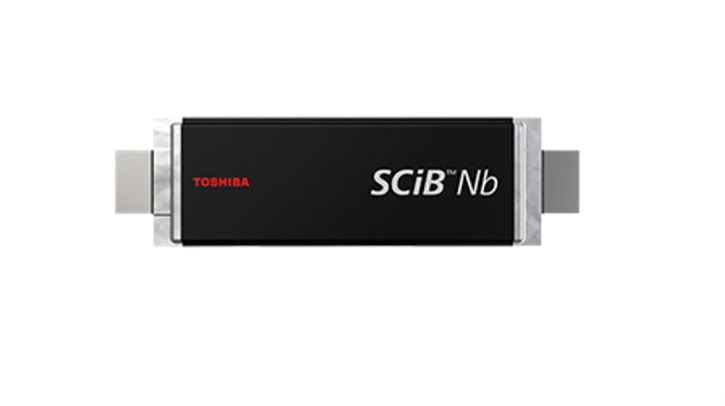Toshiba Corporation has announced it is offering potential users the opportunity to evaluate its latest lithium-ion battery, the SCiB Nb, which has been designed to “advance the electrification of buses, trucks and other commercial e-vehicles where high operating rates are essential”.
The SCiB Nb is said to be the world’s first rechargeable lithium-ion battery with a niobium titanium oxide (NTO) anode. This gives it a volumetric energy density comparable to carbon-based lithium-ion rechargeable batteries with lithium iron phosphate cathodes (LFP batteries) – the current battery of choice for electric vehicles – plus distinct advantages in rapid charging and a long life. The SCiB Nb achieves an 80% charge in just 10 minutes, and even with repeated rapid partial charging, it has an estimated lifespan of 15,000 cycles, says Toshiba.
Partnerships
Toshiba is working in close collaboration with two strategic partners: Brazil’s CBMM, world’s largest producer and seller of niobium; and Japan’s Sojitz Corporation, CBMM’s sole agent for the Japanese market. Toshiba is now ready to bring this rapid-charging, long-life product to market. The partnership will initially target use in commercial e-vehicles where high availability and operating rates are essential, particularly electric buses and trucks.
Under a joint development agreement, Toshiba, CBMM and Sojitz Corporation have conducted real-world demonstration experiments with a prototype e-bus fitted with the new battery at the CBMM industrial plant in Araxá, Brazil. The 50Ah laminate cell about to come to market is expected to find use in commercial e-vehicles, plus ships and stationary battery storage systems.
Sustainable fast charging
Achieving carbon neutrality requires the electrification of mobility and power devices, which is driving demand for rapid charging to enhance battery availability and ensure high operating rates. Toshiba’s SCiB Nb battery is designed to support fast charging and may be suitable for commercial electric vehicles, such as buses and trucks, that follow fixed routes and operate with high frequency.
Charging at designated points along these routes can potentially reduce the number of batteries required, and the battery’s long-life characteristics could help lower total ownership costs by minimizing the frequency of replacements due to degradation.
Carbon-based lithium-ion rechargeable batteries, including lithium iron phosphate (LFP) types, offer sufficient energy density for many applications. However, repeated rapid charging can lead to lithium deposition on the anode, raising the danger of safety-compromising short circuiting in the cell, particularly as the batteries start to degrade.
In contrast, the niobium titanium oxide (NTO) anode used in the SCiB Nb battery, similar to the lithium titanate anode in the original SCiB, does not cause metal lithium deposition and can be used safely for a long time, even with repeated rapid charging.
In related news, BASF has launched the Ultramid Advanced N3U42G6 polyamide 9T with non-halogenated flame-retardant, adding to its polyphthalamide (PPA) portfolio. The PPA is said to minimize electro-corrosion of metal contacts in electric and electronics (E&E) parts for e-mobility. Read the full story here


